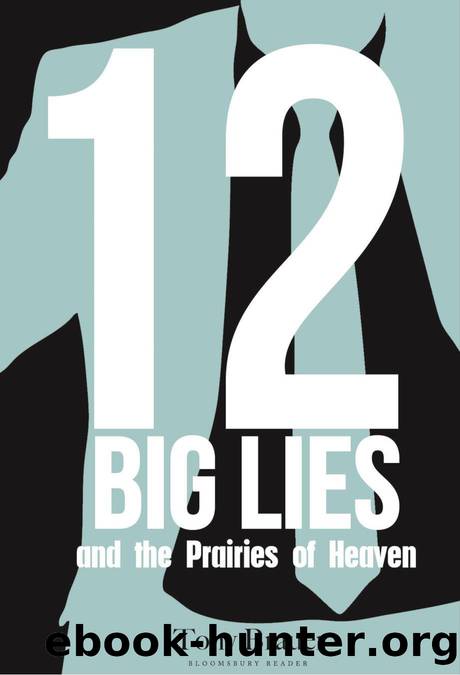12 Big Lies and the Prairies of Heaven by Tony Brauer

Author:Tony Brauer
Language: eng
Format: epub
ISBN: 9781448210701
Publisher: Bloomsbury Publishing
Published: 2019-12-18T00:00:00+00:00
A more liberal approach: anything not compulsory or forbidden is allowed. Call this alternative 1.
Alternative 2. Anything not compulsory or forbidden must be evaluated against complex criteria. You structure it like this when evasion is unacceptable; when, whatever it is, someoneâs got to deal with it.
Within alternative 1 comes the commercial contract. Unless something is forbidden or compulsory, itâs optional: which means that you can externalise costs.
Within alternative 2 comes the professional contract, including the profession of the civil servant. If something is neither forbidden nor compulsory, but clearly relates to your responsibilities, you have to deal with it. You canât shuck it off. Itâs your baby.
Externalisation takes a number of forms in public services. Obviously, you seek to exclude any client who is not profitable, simply by claiming that they donât meet your client profile. This also shifts the burden of proof onto the client, while the civil servant is expected to prove why you should be excluded. Seeking redress is expensive and hard work, particularly against a big corporation, so justice has become an externalised cost. So has transparency, because civil servants are subject to freedom of information, and commercial contracts are confidential. Public service employers are supposed to be model employers: decent terms and conditions, pensions, health and safety, and so on. Commercial contractors do the minimum demanded by law and the labour market, often shifting costs onto the hidden subsidy of, for example, housing benefits.
A favourite story, illustrative of another crucial issue. An elderly woman in the Norfolk countryside phones the police. Thereâs someone lurking in the garden. The police say they have no cars available. She rings off. Ten minutes later she phones again.
âDonât bother to send a car, Iâve shot him.â
Within quarter of an hour there are two helicopters overhead and sirens approaching from all directions. The woman is in the moonlit garden.
âWhereâs the body?â
âOh, I made that up.â
âSo why did you tell us you shot him?â
âWhy did you tell me there were no cars available?â
Public services have to deal with peaks and troughs. The fire brigade canât say theyâll come and put out a fire next week. There is redundancy built into the system to deal with peaks. This is expensive, so unless an outsourcing contract can avoid all ambiguity, contractors defer work at the peak times and externalise the inconvenience to the client. This also acts as a rationing device. Letâs say I have a contract to deal with enquiries from those who feel theyâve suffered racial abuse. If I have a 60p a minute help-line, with six layers of âPlease select from the following optionsâ¦.â, followed by âWe are experiencing exceptionally high demandâ¦..â, then I should be able to respond in full to anyone who has the patience and income to get through. From the point of view of policy makers, this rationing is bliss, because the incidence of notified racial abuse will decline, proving that government policy is working; or, from my point of view, proving that rationing is a self-fulfilling technique for cutting ostensible demand.
Download
This site does not store any files on its server. We only index and link to content provided by other sites. Please contact the content providers to delete copyright contents if any and email us, we'll remove relevant links or contents immediately.
International Integration of the Brazilian Economy by Elias C. Grivoyannis(111059)
The Radium Girls by Kate Moore(12028)
Turbulence by E. J. Noyes(8051)
Nudge - Improving Decisions about Health, Wealth, and Happiness by Thaler Sunstein(7707)
The Black Swan by Nassim Nicholas Taleb(7129)
Rich Dad Poor Dad by Robert T. Kiyosaki(6633)
Pioneering Portfolio Management by David F. Swensen(6301)
Man-made Catastrophes and Risk Information Concealment by Dmitry Chernov & Didier Sornette(6019)
Zero to One by Peter Thiel(5802)
Secrecy World by Jake Bernstein(4753)
Millionaire: The Philanderer, Gambler, and Duelist Who Invented Modern Finance by Janet Gleeson(4478)
The Age of Surveillance Capitalism by Shoshana Zuboff(4293)
Skin in the Game by Nassim Nicholas Taleb(4250)
The Money Culture by Michael Lewis(4207)
Bullshit Jobs by David Graeber(4191)
Skin in the Game: Hidden Asymmetries in Daily Life by Nassim Nicholas Taleb(4007)
The Dhandho Investor by Mohnish Pabrai(3765)
The Wisdom of Finance by Mihir Desai(3748)
Blockchain Basics by Daniel Drescher(3583)
